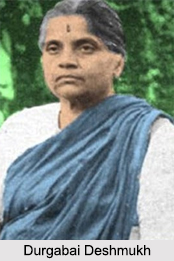 Durgabai Deshmukh was a feminist, a Parliamentarian, an administrator and a great visionary. She considered that her mission in life was to uplift the socially oppressed and politically neglected mass of India. When she was the member of the Parliament, she carried out programmes for educating, training and rehabilitating the needy women and children. She was the founder of Andhra Mahila Sabha institutions and other important social welfare organizations. She was known as the "Mother of Social Service in India". She was awarded the Paul Hoffman Award for her contribution to social work.
Durgabai Deshmukh was a feminist, a Parliamentarian, an administrator and a great visionary. She considered that her mission in life was to uplift the socially oppressed and politically neglected mass of India. When she was the member of the Parliament, she carried out programmes for educating, training and rehabilitating the needy women and children. She was the founder of Andhra Mahila Sabha institutions and other important social welfare organizations. She was known as the "Mother of Social Service in India". She was awarded the Paul Hoffman Award for her contribution to social work.
Early Life of Durgabai Deshmukh
Durgabai was born in 1909, at Rajahmundry, in a middle class family of Kakinada. At the age of 8 years, she was married to Subba Rao, son of a prosperous Zamindar family and her cousin. She decided to break the bond and engage herself in "public life". She tried to convince her husband that she would not be a suitable wife for him and hence they could part. Her family supported her in her decision to leave him to pursue her education.
In spite of her active participation in the national struggle, Durgabai found time to complete her higher education. She finished her B.A and her M.A in Political Science in the 1930s from Andhra University. She went on to obtain her Law degree from Madras University in 1942 and started practising as an advocate in the Madras High Court.
Career of Durgabai Deshmukh
Durgabai Deshmukh was fascinated by the teachings of Gandhiji and became a devoted Congress sevika. She, at a very young age followed the ideals of Gandhiji. She wore khadi and boycotted English medium schools.
 Durgabai Deshmukh was imprisoned during the Salt Satyagraha and was sent to Vellore Jail where she blended with other women prisoners. To her shock, she found that many of them did not even know for what reason they were convicted. Touched by their ignorance and misery, she vowed that she would work for enlightening the women folk of India. She was arrested thrice during the Satyagraha movement. She spent her last term in Madurai Jail where she was kept next to the cell of murderers. Their agonized cries shattered her nerves. She considered that her mission in life was to live for the poor, oppressed and downtrodden.
Durgabai Deshmukh was imprisoned during the Salt Satyagraha and was sent to Vellore Jail where she blended with other women prisoners. To her shock, she found that many of them did not even know for what reason they were convicted. Touched by their ignorance and misery, she vowed that she would work for enlightening the women folk of India. She was arrested thrice during the Satyagraha movement. She spent her last term in Madurai Jail where she was kept next to the cell of murderers. Their agonized cries shattered her nerves. She considered that her mission in life was to live for the poor, oppressed and downtrodden.
Durgabai organized four regional conferences to enunciate a Population Policy for India and prepared comprehensive reports for the national leadership and the United Nations. She worked persistently for population control, which she considered as the backbone for the progress and prosperity of the nation. Durgabai established the Blind Relief Association. She also introduced courses for school dropout girls under Social Welfare Board Programmes.
Durgabai Deshmukh contested the first election to Parliament and lost. So she planned to return to Madras (now Chennai) and attend to her legal practice. But Jawaharlal Nehru persuaded her to stay in Delhi and kept her occupied with various assignments. It was she who first brought forth the idea of setting up Family Courts in India as she had seen such courts functioning in China. Durgabai became the member of the Planning Commission in charge of social welfare. She was the first chairperson of the National Council on Women"s Education, established by the Government of India in 1958.
Durgabai Deshmukh became the member of the Constituent Assembly. In 1937, she established the Andhra Mahila Sabha, which consisted of a hospital, nursing home, nurses training centre, literacy and crafts centers. Durgabai along with her husband conceived the India International Centre and the Council of Social Development and Population Council of India in New Delhi. Because of her major contributions in the field of education of girls and disabled children, she was given the title of "Mother of Social Work in India" by late Prime Minister Indira Gandhi. She breathed her last on May 9, 1981.
Personal Life of Durgabai Deshmukh
In 1953, Durgabai married C.D. Deshmukh, the first Indian Governor of the Reserve Bank of India and Finance Minister in India"s Central Cabinet during 1950-1956. Being a human being par excellence, she supported the widow of her first husband, Timmaiamma, after his death. Timmaiamma lived with Durgabai and C.D. Deshmukh, and Durgabai also arranged vocational training for her.






